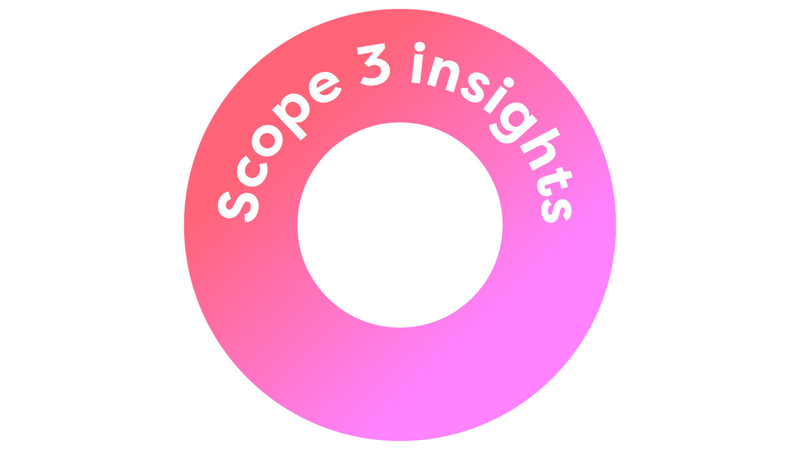Supplier engagement for scope 3: Insights from Honda North America and Roche

In order to tackle the difficult challenge of scope 3 decarbonisation, we support the Scope 3 Peer Group- a collaborative group of 200 leading corporate businesses to share knowledge and best practice.
Our insights guide is a central hub for information which all of our members contribute to. It includes interviews, videos and documents which address the central themes of:
· Data and methodology
· Policy and guidance
· Securing internal buy-in
· Supplier engagement
· Target setting.
Below is an interview from one of our scope 3 insights on the topic of supplier engagement.
A special thanks to our contributors: Lucy Pickett, EMEA Regional Sustainability and Risk Manager- Global Procurement, Roche.
Alissa Yakali, Supply Chain Sustainability Manager, Honda North America
Engaging and motivating suppliers
How do you align goals with suppliers?
Alissa: In the past Honda has used round table conversations for open dialog between us and the suppliers. This worked well in understanding the starting points.
How do you influence and encourage your suppliers to obtain goals effectively without being too prescriptive and telling them how to run their business, to scale?
Lucy: Set a vision - sell the real and tangible benefits of sustainable practices.
Align with supplier goals and state that taking action/reporting to us as a customer will ultimately help fulfil their aims (for their shareholders, for example).
Communicate out the vision, build trust and rapport in a collaborative manner.
Offer something in return - e.g. cost savings through more efficient energy practices, insight into how our organisation achieves our own sustainability goals and how that applies to the supplier’s operations. Share knowledge and offer benefits.
Alissa: With good customer service and trust. Honda has conversations on why something in important to Honda and to the industry.
How do we persuade our suppliers that it is worth their while to engage and give us the data?
Lucy: You might be surprised that they don’t actually need persuasion!
Sustainability likely features on their goals somewhere - it will just be a matter of priority. Identifying a person who champions it within the supplier organisation and building collaborative relationships is key. The same as it would be in any SRM initiative. Equally, be clear about your vision and expectations - suppliers can only align and respond if they know what is being asked of them!
Alissa: We have a supplier sustainability scorecard. This is how suppliers can see how they rank against their Honda supplier peers.
What level engagement should we expect from suppliers - and how much do we need to collaborate?
Lucy: My advice is to focus on a sample for a pilot. That way your expectations aren’t too high! Go for strategic, long term and high throughput suppliers. If you have the relationship already and it is a two-way relationship of trust then it is a good foundation for bringing sustainability initiatives onto the agenda. Using successes with existing suppliers can help build confidence to focus those that aren’t so receptive, but also provides evidence of what has worked well in the past as a way of persuasion.
Alissa: 100% engagement and 100% collaboration. They go hand in hand. When suppliers trust and enjoy working with your team these should come.
How do you balance the carrot versus stick in supplier engagement?
Lucy: It depends on your organisation’s general ethos, but whatever is chosen - ensure it has top level buy in and be consistent. Some suppliers will buy into the carrot of achieving sustainability because they also have that on their corporate agenda. Others might want to achieve certain levels but don’t have the resources to know how. The carrot can be a powerful tool when it translates into bottom line efficiencies. For our organisation, we are currently reviewing whether making reporting contractual should be a prerequisite of doing business with us - but it is a fine ethical line that we will always err on the side of caution. We would prefer to be truly collaborative and offer benefits, rather than penalties for non-conformance. It will be interesting to see how our position changes as Scope 3 reporting moves forward!
Alissa: We are 100% carrot! In this space a stick will only give you upset suppliers not willing to engage.
What if suppliers need to invest a lot of capex to make an environmental step change? How can you influence them to do this?
Lucy: This is a tough one! Be transparent in the results if they do undertake the investment. Don’t oversell them and don’t overpromise. For example, don’t tell the supplier that making this investment will mean they are the sole preferred supplier for the next X years if it isn’t true! On the other hand, if your organisation really does treat sustainability criteria as equal to cost and quality and it will have a real influence in where goods/services are sourced from then share this. The benefits of investing will speak for themselves whilst empowering the supplier to reach the conclusion on their own.
What examples are there of genuine business cases for collaboration between suppliers and customers to reduce GHG emissions?
Lucy: I can offer a specific example for Roche. Looking at remote monitoring of clinical trials. Cuts down on CO2 from travel, produces faster results through agility, saves costs. Something that emerged naturally as a result of COVID-19 and a mutually beneficial endeavour for all parties throughout the supply chain. More generically - think of the business case for Scope 1 & 2 within your own business and how you have sold the benefits (financial, time, co2 reduction etc) and apply that to your suppliers to see if it's something you can partner in. Suppliers are an extension of us.
Alissa: Putting together a tool to help suppliers like Manufacture 2030 has been great for collaboration. Suppliers know Honda is serious about reduction.
How do you engage suppliers on renewable electricity? Do you help them to buy renewable energy certificates, PPAs or on-site renewables?
Lucy: We are currently piloting this in the UK whereby we are offering our suppliers access to a competitive rate for 100% rego backed renewable electricity, in return for reporting on their electricity usage. Essentially we are using our purchasing power for the benefit of our suppliers. It is challenging! There are lots of things to negotiate both internally - from research and data gathering to reporting, to politics, to scaling it into a meaningful project, and externally - setting the right tone in communicating, negotiating with energy providers, navigating legal & contractual issues (The list goes on). It takes a big commitment to see it through, and it is not a quick win. The bottom line however is that we are taking all the pain to make it easy for suppliers to transition to renewable energy. We come at it from a place of altruism to help our supply chain meet their own Scope 2 goals. Suppliers need to see financial benefits and process efficiencies and need to trust you enough that they don't feel you are going to use these efficiencies against them.
How do we help smaller suppliers to report accurately and act effectively?
Lucy: Education is really important, as well as selling the vision to ensure it makes it onto their priority list. This isn’t always easy. Third party reporting companies can be a massive benefit as they can dedicate the time to educate and provide insight into the benefits of such reporting. In addition, reporting through a third party supplier where the smaller suppliers agree for their data to be shared with other customers lightens the burden whilst having a far reach.
Alissa: We give ALL suppliers the same opportunities. If smaller suppliers are stretched on resources more time can be given to complete deliverables.
Scaling supplier engagement
How to manage engagement, data collection and analysis with thousands of suppliers involved?
Lucy: Start small: focus on a meaningful sample, build collaborative relationships, include it as part of your SRM agenda and utilise external ‘experts’ whose business is to help where needed. Getting traction with a small sample is more impactful in persuading others in order to scale up.
Alissa: Agree on start small and see where it makes sense to increase; look at spend or what suppliers could be higher risk.
Contact us for more information about the scope 3 group
